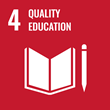Project information
Vis4Schools: Fostering Information Visualization Literacy in Schools
- Project Identification
- GF22-06357L
- Project Period
- 3/2022 - 12/2024
- Investor / Pogramme / Project type
-
Czech Science Foundation
- LA Grants
- MU Faculty or unit
- Faculty of Informatics
- Keywords
- Digital Media, Human-Computer Interaction, Visualization, Playful Approach
Background
The amount and complexity of data have grown tremendously in the last decades. Consequently, tools to support people in handling the enormous amounts of data are in urgently needed. One way to accomplish this is using visualizations. They take advantage of the powerful human perceptual system, which is adept at spotting patterns in visual input and making sense of it.
Project Content
Visualization processes transform data into graphical representations. The transformation processes need to be fully transparent to enable users to reconstruct and decode the visual representations and draw conclusions about the underlying data. Even though humans are “visual beings” and understand visual representations more easily than other forms of data representations, the skills to create, read and interpret visualizations need to be acquired and trained. Unlike reading and writing text, people usually do not learn these skills in the course of their school education. Hence, most users have difficulties working with visual representations or identifying characteristics of the data on which they are based.
Goals
The goal of this research project is to explore how digital learning materials need to be designed and which pedagogical methods are best suited to raise the level of visualization literacy (i.e., constructing and interpreting data visualizations) in school education. We tap into the power of visualization grammars, that formally describe the visual mapping and data transformation processes and enable a (semi-)automated creation of learning materials.
Methods
We use a combination of well-established qualitative and quantitative methods based on a user-centered design cycle. The target groups are students from the age of 14 up to 19. A central element of the project is co-creation workshops, in which the target group is actively involved – specifically in the analysis and requirements process as well as in the design and evaluation steps. For teaching, we employ learning materials based on videos and animations, educational games, textual descriptions with graphics, and visualization technologies (i.e., visualization grammars). The resulting technical framework and guidelines for the design and integration of learning materials on data visualizations will be made available for educational institutions and teachers.
Results
The project tackles challenges that arise in teaching competencies on data visualization. Our approach, which makes use of interactive learning materials such as video and animation, educational games, and a website with textual descriptions for graphics, breaks new grounds; specifically, as we target students from the age of 14 to 19 years. Also, utilizing declarative visualization technology (i.e., visualization grammars) for creating learning materials in a (semi-) automated way is a completely new idea with substantial innovation potential. With the integration of our learning materials into the daily educational routine, the level of visualization literacy of students can be improved significantly. As we develop a technical framework and guidelines for the design and integration of learning materials for data visualizations, teachers, educational institutions, as well as students in lectureships will benefit from the outcomes of the project.
Partners
St. Pölten University of Applied Sciences/Wolfgang Aigner (Lead) & Christina Stoiber
Austrian Computer Society (OCG)/Martin Kandlhofer, Ronald Bieber
Sustainable Development Goals
Masaryk University is committed to the UN Sustainable Development Goals, which aim to improve the conditions and quality of life on our planet by 2030.
Publications
Total number of publications: 5
2024
-
Across the Planets - Playful Approach for Learning the Shortest Path Algorithm for Graphs in Augmented Reality
Proceedings of the 27th International Academic Mindtrek Conference (Mindtrek '24), year: 2024
-
Mapping the Landscape of Data Visualizations in Schools and Educational Resources
Year: 2024
-
Play and Viz: Using Entertainment Games for Exploring Data Visualizations
Proceedings of the 19th International Conference on the Foundations of Digital Games, year: 2024
-
Towards a Taxonomy of In-Game User Interface Visualizations
Proceedings of the 27th International Academic Mindtrek Conference (Mindtrek '24), year: 2024
2023
-
Construct and Play: Engaging Students with Visualizations through Playful Methods.
In Companion Proceedings of the Annual Symposium on Computer-Human Interaction in Play (CHI PLAY Companion '23), year: 2023
